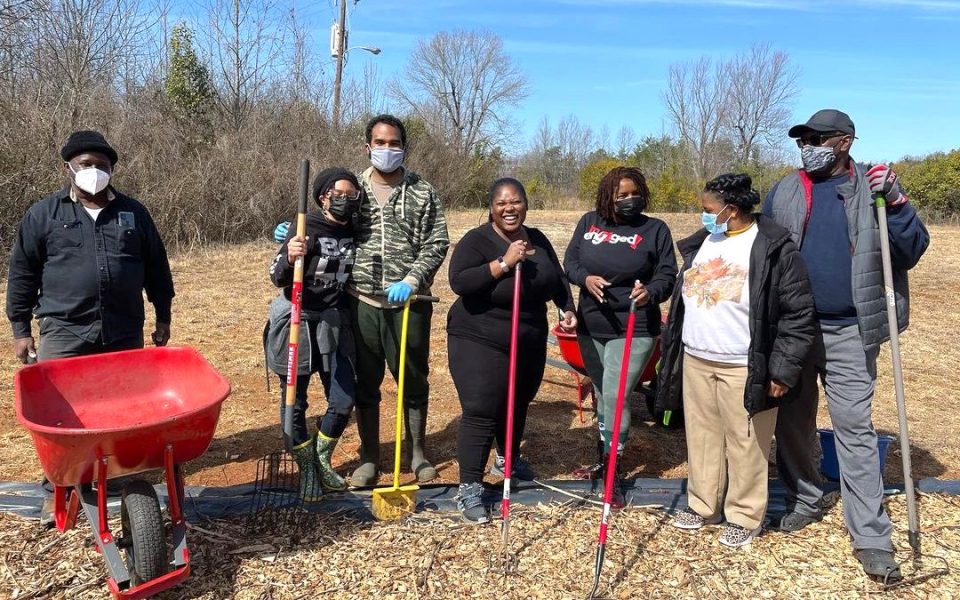Featured photo: The PDY&F community garden is mostly staffed by volunteers at this point. (courtesy photo)
Northeast Greensboro has been hit hard over the past 20 years. It’s a community dealing with the consequences of disinvestment and is one of 80 designated food deserts in North Carolina.
In 1998, Winn Dixie Corp. restructured its corporate model and closed the sole source of retail grocery in this section of the city, leaving the shopping center with no anchor stores to replace it. Then, community members fought a 12-year battle with city government to prevent the expansion of the White Street Landfill. In April 2018, an EF-2 tornado touched down, destroying large swathes of northeast Greensboro where, according to the city, 174 households needed relocation assistance and caused schools to be shut for months. Then, in 2016, the creation of the Renaissance Community Co-op aimed to combat the 18-year absence of a grocery store in the community. While only open two years, the grocery store encouraged community wealth, ownership and provided access to healthy food options.
In January 2019, it closed, widening the food access gap for thousands of households.
Now, almost two years later, a new community garden located near the old co-op aims to curb the effects of hunger in the area. Staffed by volunteers and board members, the Positive Direction for Youth and Families (PDY&F) is a nearly 30-year-old nonprofit whose goal is to alleviate hunger and homelessness through a variety of programming. A local donation of two acres of land at 1500 Huffine Mill Road kicked off the project, which aims to train volunteers, introduce gardening to eager students, provide healthy food options, significantly decrease food apartheid, combat hypertension and diabetes, generate wealth in the community and create the next generation of Black and brown farmers.

“It’s nice to have canned goods and pantry items, but we want to address the health issues,” says Faith Lockett Gardner, PDY&F assistant executive director and local pediatrician.
Food deserts, defined by the USDA as “urban neighborhoods and rural towns without ready access to fresh, healthy, and affordable food,” are a significant problem in the state. According to a NC Committee on Food Deserts report from 2013, residents living in food deserts are more likely to suffer from obesity, diabetes, cardiovascular disease and other diet-related conditions, while simultaneously being more likely to be food insecure.
Gardner’s husband, James, has taken the reign of the garden as an avid home gardener and science teacher at Ragsdale High School. He had a garden as a child growing up in rural Virginia and is digging into his roots by providing guidance and direction to volunteers.
The garden started the first week of December with a few raised beds, mulching and soil. During the first week of February, turnips, onions, garlic, strawberries, potatoes, beets and carrots were planted. Volunteers have donated soil, mulch and their time, but more is needed.
“We need more,” James says. “We want to beautify the area and make it accessible to everyone.”
Star Surgeon, a family and consumer science teacher in Graham is a PDF&Y volunteer who is passionate about promoting community sustainability through nutrition.
“Once you get the community involved and people have access to quality foods, you can change the health of the community,” says Surgeon.

Having the opportunities to have healthy food is important. The Gardners and other community members with PDY&F have lofty, yet attainable goals for the garden. The hope is to build and maintain an all-organic garden in four phases. Phase one involved hiring a horticulturalist to build raised beds and lay the foundation. The project is currently in phase two — in-ground gardening. Phase three looks to develop hydroponics and aquaculture to produce three times the food while utilizing only half the carbon footprint.
Right now, volunteers are being asked to bring water to the site for irrigation as the site does not yet have access to water, electricity or restroom facilities.
“There’s a void right now and I think we can be the ones that fill it,” says James. “It’s doesn’t matter your color, who you are or who you sleep with, when you’re hungry, you’re hungry.”
Learn more about the PDY&F community garden on their Facebook page.
Join the First Amendment Society, a membership that goes directly to funding TCB‘s newsroom.
We believe that reporting can save the world.
The TCB First Amendment Society recognizes the vital role of a free, unfettered press with a bundling of local experiences designed to build community, and unique engagements with our newsroom that will help you understand, and shape, local journalism’s critical role in uplifting the people in our cities.
All revenue goes directly into the newsroom as reporters’ salaries and freelance commissions.


The efforts of PDY&F are absolutely outstanding. Thank you PDY&F and volunteers!!!!